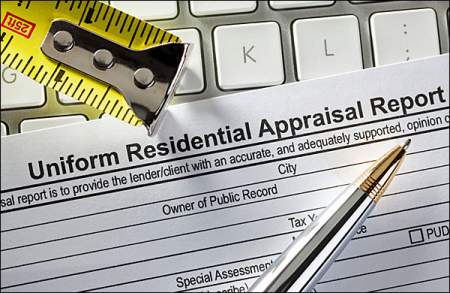Selling a home can be a stressful, laborious task. Figuring out the proper listing and valuation while ensuring all the details are in order is no minuscule task. Luckily, a pre-appraisal can put your mind at ease. A home inspection can help you find issues or benefits you weren’t aware of, things that can add value and leverage to the selling negotiations.
Real estate appraisals require thorough research and information verification. Each assignment an appraiser takes on requires strict attention to detail. An appraiser’s valuation ultimately has great influence on the housing transaction and confidence of the parties involved. In the end inspections and appraisals let potential buyers know that you are willing to be completely transparent about your property. A pre-appraisal increases your credibility while saving time and money.
Your home will be inspected and evaluated based on its’ age, condition, renovations, as well as many other factors such as neighborhood price range, comparable properties and the state of the housing market.
An appraiser’s job is to work with the data and information available, to provide an unbiased valuation estimate. They will need to know the terms of sale, including financing and interest rates, as well as sales information so they can adjust where needed. This usually involves the help of your real estate agent.
Still wondering if you should get a pre-appraisal before your home hits the market? We’ve got you covered.
Why Get a Pre-Appraisal Before Listing?
 A pre-appraisal is crucial for establishing confidence in your home’s potential buyers. A pre-appraisal gives you the opportunity to gather valuable data and information about your home, and a licensed and highly-trained appraiser can provide critical insight into the listing process. Buyers will have the up most confidence knowing you are a highly credible seller.
A pre-appraisal is crucial for establishing confidence in your home’s potential buyers. A pre-appraisal gives you the opportunity to gather valuable data and information about your home, and a licensed and highly-trained appraiser can provide critical insight into the listing process. Buyers will have the up most confidence knowing you are a highly credible seller.
A pre-appraisal will allow you to have written reports on valuation estimates, including any sales data and value trends for similar properties in the area. This can only increase your confidence as a seller and provide security, insurance and transparency to prospective buyers. An appraiser’s job is to assess your property and report on value, it’s a very cut and dry approach, but one that can help you set realistic expectations for what your property is worth.
Additionally, a pre-appraisal may help you fully understand the reasoning behind your listing price and the many factors that go into property valuation. An appraiser can also notify you of all items that require repair before a loan closure. If your home is being listed with FHA financing, failure to address parts of your home that require repair will ultimately be added to the bill during final inspections. A pre-appraisal will save you money and ease your selling process, while increasing confidence on all sides of the table.
What is A Pre-Appraisal?
A pre-appraisal is like a normal home appraisal. It is an estimate of the market value of your property from a licensed appraiser’s perspective. A common practice for appraisals is in refinance transactions, where an appraisal would be used to determine if the contract price matches with the overall quality of the home, as well as location and features.
An appraiser will look at numerous sources of data to determine a confident value for your home. This includes the age of the house, square footage, and overall quality of your home, the location of your house and listing price. As well as an in-depth comparison to other homes in the neighborhood. Important factors in the appraisal process include any upgrades your home has had, the health of the housing market, and the general state of the economy.
What is the Process of a Pre-Appraisal?
The pre-appraisal process is quite simple. It starts with a bank order. If you acquired a loan for your property, the lending institution (usually a bank) will submit a request for appraisal of real estate. Keep in mind, the appraiser is required by law to only contact your bank after the appraisal is finished, this is to ensure that there is no influence on your home’s appraised value. It is always smart to ensure the appraiser is local and understands the housing market in your location.
 Next is the property inspection. The appraiser will set up an appointment to view the property through your real estate agent.
Next is the property inspection. The appraiser will set up an appointment to view the property through your real estate agent.
The appraiser will assess your property’s conditions, look for any upgrades and areas that need maintenance. They will also check the square footage and age of the home, as well assess the condition of the neighborhood as well. Extra information can go a long way, and sometimes appraisers miss a few crucial details here and there. Be sure that the appraiser has gathered an accurate and detailed account of your property. They may ask to be notified of any extra features your home contains or the construction process itself. Perhaps the home is in a great part of the county, or the neighborhood contains a world renown eatery. If you believe there are some things about the home or surrounding area that will help influence your homes valuation, the appraiser needs to know about these factors to properly adjust your appraisal. Remember, an appraisal should be an unbiased assessment of data and information.
Housing Comparisons
After the inspection is over, the appraiser will look at sales data from the multiple sales listings (MLS) and public records. This will give them a good idea of property value in comparison with similar homes on the market.
While this is a major factor in your home’s appraisal, it is important to know that things like location, interior finishing, landscaping, neighborhood and overall property size have important influence in your home’s ideal selling price.
Finalizing a Pre-Appraisal
After the appraisal is completed, and the home properly inspected, a report will be drafted that includes the estimated value of your real estate. This usually includes comparable properties, as well as the conditions of your home, a picture, and a map with the location as well.
How to Choose an Appraiser
 Finding the right appraiser is an extremely important part of any successful property sale. You must carefully screen any potential appraisers. You can start by checking credentials and asking them any questions you might have. Look for an appraiser that is familiar with your property type. For example, an appraiser who usually inspects apartments may not be as well suited to examine Victorian style homes.
Finding the right appraiser is an extremely important part of any successful property sale. You must carefully screen any potential appraisers. You can start by checking credentials and asking them any questions you might have. Look for an appraiser that is familiar with your property type. For example, an appraiser who usually inspects apartments may not be as well suited to examine Victorian style homes.
Often your real estate agents will have a local, licensed appraiser in mind. Be sure to ask you agent if they know an experienced appraiser. But be sure to converse with multiple appraisers, go over licenses, education and certification. Having a lot of options can only help you find the right appraiser who can accurately value your home. An appraiser’s best asset is their unwavering commitment to shy away from biased opinions.
Ask questions! We cannot stress this enough. Since each home owner has their own specific needs, it it vital that the appraiser understands all the ins and outs of your property and is adept to handle the many factors that influence your home’s overall value.
How Can a Real Estate Agent Help?
A real estate agent is an expert in housing purchases and sales. They can help provide your appraiser with numerous bits of information about the property. It is important that your real estate agent provides the appraiser with adequate information regarding all the contract activities for the property that is to be inspected.
Sometimes the market may have a greater demand for homes than are readily available. This can result in bidding wars between numerous prospective home buyers, and often the price on these homes will rise dramatically. If this is the case, your home will have multiple potential buyers, and thus multiple contracts. An appraiser can use this information when deciding an estimated valuation for your real estate. Of course, this works in a similar fashion if the market is slow, a home may have significant price reductions if it is one of many up for sale. An appraiser considers these conditions as buyer and seller motivation, which they will show in their appraisal report.
Additionally, your real estate agent should provide any information regarding updates and renovations that your home has undertaken. The appraiser will factor in your home’s age and compare it with any renovations before estimating what is called an “effective age”. Effective age is simply how old your home looks. And of course, this should also include property features that you feel may not be noticed initially during the appraiser’s inspection. A home’s features go into the final process for valuation.
Finally, the sales contract. The appraiser needs information regarding the loan interest rate, down payment, and seller contributions. Working with your realtor, the appraiser can accurately come to a valuation for your home.
Selling a home can be troubling, but a pre-appraisal can only help you along the way. Appraisals are powerful tools of negotiation when it comes to speaking with potential buyers, and a great way to find the right selling point for your property. Hiring an appraiser and getting a pre-appraisal will help you sell your home.
Your real estate agent is the best source of information about the local community and real estate topics. Give the Jackie Ruden Realty Team a call today at 435-272-7710 to learn more about local areas, discuss selling a house, or tour available homes for sale.





